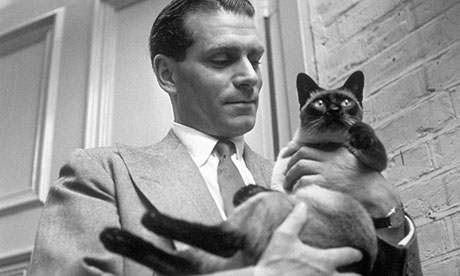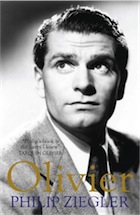Simon Callow on a brisk yet elegant chronicle of the Laurence Olivier phenomenon

Olivier with the family cat at home at Chelsea, London, in 1946. Photograph: Getty Images
And still they come. Eight years after the authorised biography of Laurence Olivier by Terry Coleman, here is another, by the distinguished biographer of, among others, Edward VIII, Lord Mountbatten, and William IV. Why, one asks? Coleman's book was a very unsatisfactory affair, which may be answer in itself. But for whom has the present volume been written? There are fewer and fewer of us around who saw him on stage; his last appearance in the theatre was 40 years ago, and his film performances are more inclined to provoke ridicule than admiration among younger audiences (or indeed, younger actors). Of course, his position in the history of the theatre is guaranteed, though that, in the nature of things, is a somewhat niche distinction. He was a great celebrity, with a famous love life. But these things fade with time and changing social mores. What, then, is the story? Each biographer gives a different answer. For Coleman, it seemed to be his sexuality. For Philip Ziegler, the fascination of the life lies in its last 20 years. Many biographies run out of steam towards the end; this one gains momentum as soon as Olivier creates the National theatre, which is seen to be the climax of his life and career, as well as its tragic undoing.
 Ziegler is an elegant, unfailingly lucid writer, his manner brisk and incisive: he doesn't dawdle over psychological speculation, inclining to swift no-nonsense judgments: Olivier's father, an Anglican priest, is baldly described as "strident, bad-tempered and somewhat stupid", which is very possibly true, but which doesn't leave much room for us to explore the fathomless damage he seems to have done to Olivier. In his Confessions of an Actor, Olivier casually remarks – in a phrase not quoted by Ziegler – that the only problem between him and his father was that "he couldn't see the slightest point in my existence", an agonising observation that illuminates his life and career as if in a shaft of lightning. Ziegler does cite the Rev Olivier's remarkable dismissal of his 17-year-old son's vague aspirations to follow a career as a tea planter. "Don't be an idiot," said his father, who at least got one thing right, "you're going to be an actor."
Ziegler is an elegant, unfailingly lucid writer, his manner brisk and incisive: he doesn't dawdle over psychological speculation, inclining to swift no-nonsense judgments: Olivier's father, an Anglican priest, is baldly described as "strident, bad-tempered and somewhat stupid", which is very possibly true, but which doesn't leave much room for us to explore the fathomless damage he seems to have done to Olivier. In his Confessions of an Actor, Olivier casually remarks – in a phrase not quoted by Ziegler – that the only problem between him and his father was that "he couldn't see the slightest point in my existence", an agonising observation that illuminates his life and career as if in a shaft of lightning. Ziegler does cite the Rev Olivier's remarkable dismissal of his 17-year-old son's vague aspirations to follow a career as a tea planter. "Don't be an idiot," said his father, who at least got one thing right, "you're going to be an actor."
More
 Ziegler is an elegant, unfailingly lucid writer, his manner brisk and incisive: he doesn't dawdle over psychological speculation, inclining to swift no-nonsense judgments: Olivier's father, an Anglican priest, is baldly described as "strident, bad-tempered and somewhat stupid", which is very possibly true, but which doesn't leave much room for us to explore the fathomless damage he seems to have done to Olivier. In his Confessions of an Actor, Olivier casually remarks – in a phrase not quoted by Ziegler – that the only problem between him and his father was that "he couldn't see the slightest point in my existence", an agonising observation that illuminates his life and career as if in a shaft of lightning. Ziegler does cite the Rev Olivier's remarkable dismissal of his 17-year-old son's vague aspirations to follow a career as a tea planter. "Don't be an idiot," said his father, who at least got one thing right, "you're going to be an actor."
Ziegler is an elegant, unfailingly lucid writer, his manner brisk and incisive: he doesn't dawdle over psychological speculation, inclining to swift no-nonsense judgments: Olivier's father, an Anglican priest, is baldly described as "strident, bad-tempered and somewhat stupid", which is very possibly true, but which doesn't leave much room for us to explore the fathomless damage he seems to have done to Olivier. In his Confessions of an Actor, Olivier casually remarks – in a phrase not quoted by Ziegler – that the only problem between him and his father was that "he couldn't see the slightest point in my existence", an agonising observation that illuminates his life and career as if in a shaft of lightning. Ziegler does cite the Rev Olivier's remarkable dismissal of his 17-year-old son's vague aspirations to follow a career as a tea planter. "Don't be an idiot," said his father, who at least got one thing right, "you're going to be an actor."More
No comments:
Post a Comment